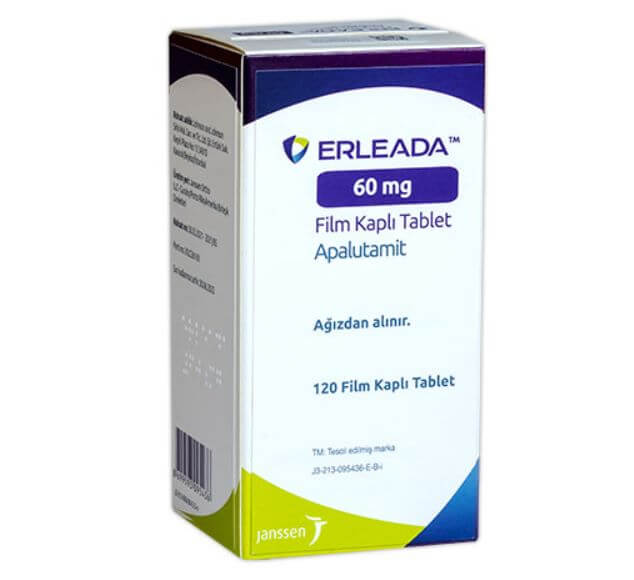Erleada (apalutamide) is a medication used to treat men with certain types of prostate cancer. It treats metastatic hormone-sensitive prostate cancer (mHSPC), which is a form of cancer that originates in the prostate gland but has spread (metastasized) but still responds to hormone therapy that lowers testosterone levels (androgen deprivation therapy). It also treats prostate cancer that has not spread but does not respond to hormone therapy (non-metastatic castration-resistant prostate cancer, or nmCRPC).
Apalutamide belongs to a class of drugs known as anti-androgens (anti-testosterone). It works by blocking the effects of testosterone to slow the growth and spread of prostate cancer.
Dosage
The dosage and regimen are set by the prescriber. It is recommended to take the prescribed dose at the same time each day. If a scheduled dose is missed, it can be made up on the same day, but do not make up for a missed dose the following day by double-dosing. The tablets can be taken with or without food and should be swallowed whole, not chewed or crushed.
This text is for informational purposes only. Please consult a doctor or pharmacist before using any medication.
Read the information leaflet that comes with the medication.
If after taking Erleada there is a sudden allergic reaction (anaphylaxis), with symptoms like swelling of the face, tongue or throat making it difficult to breathe or swallow, or there is wheezing, hives, rash, blistering or peeling of the skin, call a doctor or 911 right away, or go to an emergency room immediately.
Most people who use Erleada do not experience any negative side effects. Doctors prescribe Erleada because they assess that the benefits that such treatment yields outweighs any likely unwanted effects.
Some of the side effects that have been reported include:
- feeling exhausted
- joint pain
- rash
- decreased appetite
- weight loss
- high blood pressure
- hot flash
- diarrhea
Less common but more serious side effects can include chest pain or discomfort; shortness of breath; numbness or weakness of the face, arm, or leg, especially on one side of the body; difficulty talking or understanding; visual disturbances; dizziness; loss of balance or coordination; or difficulty walking. If any of these side effects are felt, report to a doctor or clinic as soon as possible.
Not all side effects are listed here. If these or other unlisted symptoms persist or worsen, consult a healthcare provider or pharmacist.
Prostate cancer is common in adult men and may be diagnosed early. Diagnosis is done by a biopsy that returns one of two possible positive results:
- Metastatic hormone-sensitive prostate cancer (mHSPC) is prostate cancer that has spread to other parts of the body, but which can still respond to medical or surgical treatment that lowers testosterone levels (androgen deprivation). The areas of the body where prostate cancer most often spreads to are the bones, adrenal glands, liver, and lungs.
- Non-metastatic castration-resistant prostate cancer (nmCRPC) is prostate cancer that has not spread to other parts of the body, but no longer responds to a medical or surgical treatment that lowers testosterone.
The main symptoms of early prostate cancer can include a need to urinate more frequently during the night, with a need to rush to the toilet. There may be difficulty in starting to urinate, with straining or taking a long time along with a weak flow and being left with a feeling that the bladder has not emptied fully. There may also be traces of blood in the urine or semen.













